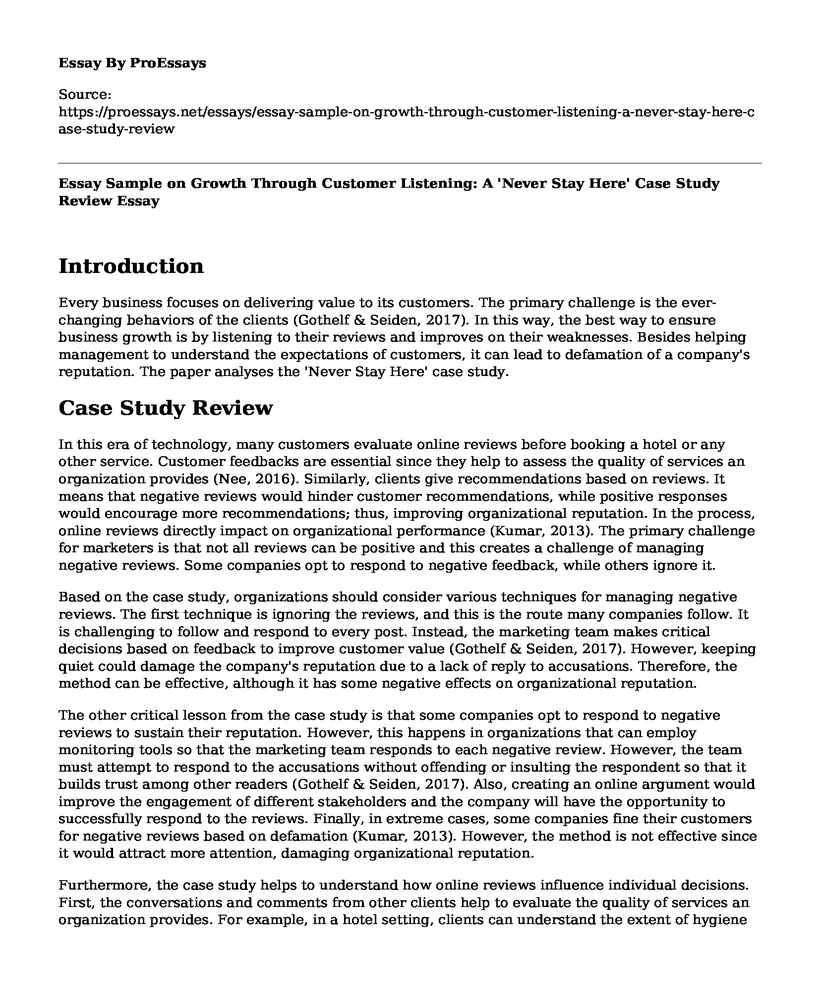Introduction
Every business focuses on delivering value to its customers. The primary challenge is the ever-changing behaviors of the clients (Gothelf & Seiden, 2017). In this way, the best way to ensure business growth is by listening to their reviews and improves on their weaknesses. Besides helping management to understand the expectations of customers, it can lead to defamation of a company's reputation. The paper analyses the 'Never Stay Here' case study.
Case Study Review
In this era of technology, many customers evaluate online reviews before booking a hotel or any other service. Customer feedbacks are essential since they help to assess the quality of services an organization provides (Nee, 2016). Similarly, clients give recommendations based on reviews. It means that negative reviews would hinder customer recommendations, while positive responses would encourage more recommendations; thus, improving organizational reputation. In the process, online reviews directly impact on organizational performance (Kumar, 2013). The primary challenge for marketers is that not all reviews can be positive and this creates a challenge of managing negative reviews. Some companies opt to respond to negative feedback, while others ignore it.
Based on the case study, organizations should consider various techniques for managing negative reviews. The first technique is ignoring the reviews, and this is the route many companies follow. It is challenging to follow and respond to every post. Instead, the marketing team makes critical decisions based on feedback to improve customer value (Gothelf & Seiden, 2017). However, keeping quiet could damage the company's reputation due to a lack of reply to accusations. Therefore, the method can be effective, although it has some negative effects on organizational reputation.
The other critical lesson from the case study is that some companies opt to respond to negative reviews to sustain their reputation. However, this happens in organizations that can employ monitoring tools so that the marketing team responds to each negative review. However, the team must attempt to respond to the accusations without offending or insulting the respondent so that it builds trust among other readers (Gothelf & Seiden, 2017). Also, creating an online argument would improve the engagement of different stakeholders and the company will have the opportunity to successfully respond to the reviews. Finally, in extreme cases, some companies fine their customers for negative reviews based on defamation (Kumar, 2013). However, the method is not effective since it would attract more attention, damaging organizational reputation.
Furthermore, the case study helps to understand how online reviews influence individual decisions. First, the conversations and comments from other clients help to evaluate the quality of services an organization provides. For example, in a hotel setting, clients can understand the extent of hygiene in a facility by assessing the experience of other customers (Kumar, 2013). Besides organizational facilities, the comments help to assess the courtesy of the employees based on how they respond to negative reviews. Importantly, the comments help to compare marketing messages and experience on the ground. Most customers make decisions based on other customers' experience and not promotions since they may be misleading. Therefore, the case study has helped to understand the power of online reviews, although it did not emphasize on the power of physical comments.
Conclusion
Getting in touch with customers is the first step towards organizational success. It will be wrong to assume the needs of the customers without engaging them. In this regard, online reviews help to understand what they think and their satisfaction levels. Based on their comments, the management can respond appropriately and take necessary steps to improve identified weaknesses and this would improve customer satisfaction.
References
Gothelf, J., & Seiden, J. (2017). Sense and respond: How successful organizations listen to customers new products continually. Harvard Business Review.
Kumar, V. (2013). Profitable customer engagement: Concept, metrics and strategies. London: Sage Publications.
Nee, I. (2016). Managing negative word of mouth-on-social media platforms: The effect of hotel management responses on observers' purchase intention. Bremen: Springer.
Cite this page
Essay Sample on Growth Through Customer Listening: A 'Never Stay Here' Case Study Review. (2023, Mar 27). Retrieved from https://proessays.net/essays/essay-sample-on-growth-through-customer-listening-a-never-stay-here-case-study-review
If you are the original author of this essay and no longer wish to have it published on the ProEssays website, please click below to request its removal:
- BHF Restaurant Business Plan
- Generational Differences Among the Kitchen Employees of the Marriott in San Francisco Research
- Corporate Social Responsibility at Olive Garden Essay
- The Benefits of Integrating Marketing and Management Strategies in Entrepreneurial Organizations
- Essay Sample on Green Clean Contract Risks and Liabilities
- Business and Entrepreneurship: An Essential Part of Education - Essay Sample
- Essay Example on Ethics in the Workplace: Fiduciary Principle & Beyond







